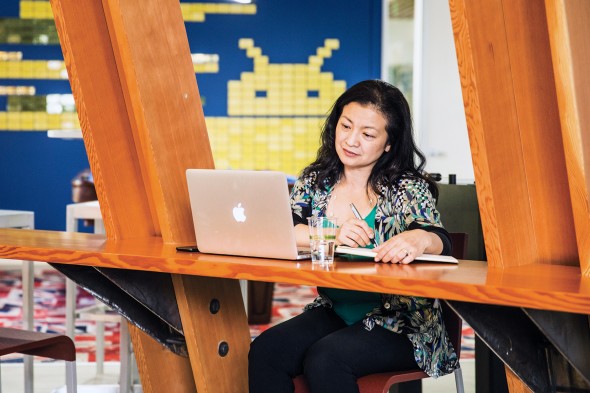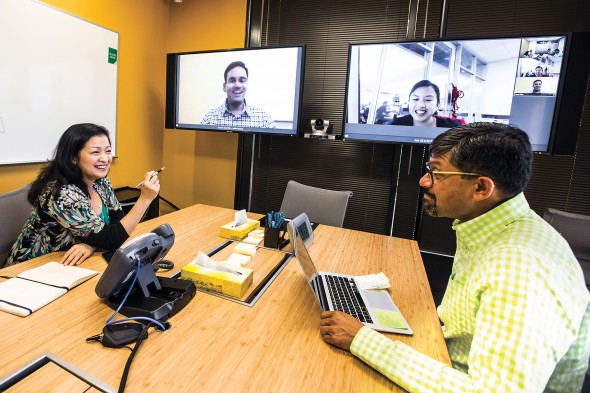UIC engineering grad’s search result: Silicon Valley

Jenny Zhao has a busy job, leading a global team of engineers at Google. “Last night, I was working with Singapore,” she says. “They sent me a proposal this morning, then they went to sleep, and I took over, and tonight we’ll sync again, and then they’re gonna work on it — so we’re actually working around the clock to get this stuff done.” Photo: Eric Millette
By Chris A. Smith — UIC Alumni magazine
It’s another beautiful day in Silicon Valley. All across Google’s sprawling campus, workers are out enjoying the weather. Dressed in flip-flops, shorts and sundresses, they amble to gourmet cafeterias, run errands on the company’s bright yellow cruiser bikes and slouch in lounge chairs, tapping away at laptops.
Inside a building on the edge of campus, past an artisanal coffee bar and a play area for workers’ dogs, Jenny Zhao is holed up in the Ain’t Talkin’ ’Bout Love room. In keeping with Google’s willfully quirky culture, the conference rooms in this building are named after rock songs — in this case, the band Van Halen’s. Today, however, Zhao is all business.
A 48-year-old engineer with a manner both personally warm and intensely focused, Zhao leans into her laptop, absentmindedly rubbing her temples. She is videoconferencing with a New York City-based member of her team, beamed onto a large flat-screen on the wall. They discuss a strategy to streamline Google’s tech support for its advertising clients — companies that place ads on Google’s search page, say, or on YouTube clips. Such remote collaboration is routine for Zhao; her team is distributed across the globe, from Boston to London to Singapore.
As an engineering director at a company founded by engineers, Zhao is among the Google elite. And as the tech industry has expanded into China and vice versa, Zhao — a Beijing native who has spent most of her adult life in the U.S. — has proven exceptionally good at translating between the two cultures.
She stands out as a female boss in a notoriously male-dominated industry and as an ace coder who has people skills — a rare combination in Silicon Valley.
“Last night, I was working with Singapore,” Zhao explains. “They sent me a proposal this morning, then they went to sleep, and I took over, and tonight we’ll sync again, and then they’re gonna work on it — so we’re actually working around the clock to get this stuff done.”
Childhood under Mao
Zhao was born into a very different world. In 1966, the year of her birth, the Chinese leader Mao Zedong launched the Cultural Revolution, aimed at cleansing China of ideologically impure elements. Both Zhao’s parents were engineers — her father, Jian, won awards for his aerospace innovations — and middle-class by the standards of the day. This made them targets. Militants arrested, beat and imprisoned her father and pressured her mother to denounce him. She refused.
Eventually Zhao’s father was released from prison and by the mid-1970s, the revolutionary fever started to break. In 1982, as China began opening up to the West, the government chose Zhao’s father to be among the first Chinese professionals and academics allowed to visit the U.S.
He studied electrical engineering and management economics at UIC. Owing to various professors with ties to China, a healthy flow of Taiwanese graduate students and Chicago’s sizable Chinese community, the campus was, and remains, a leader in recruiting Chinese scholars.
He returned home two years later, convinced of the superiority of the U.S. education system. By then, Jenny Zhao had gotten into China’s most prestigious medical university. But Jian Zhao decided to take a chance: he would send his daughter to UIC.
Culture shock
In 1984, Zhao took a train to southern China, a ferry to Hong Kong and a succession of planes to America. When she touched down at O’Hare International Airport, her UIC sponsor, Judy Curry, was waiting. The now-retired UIC associate vice chancellor and communications professor had been her father’s adviser; Curry arranged for Zhao to work as a live-in nanny in Oak Park in exchange for room and board.

With as many as eight meetings a day, Zhao uses her limited free time to retreat to a company café, one of many employee perks offered by Google. Photo: Eric Millette
Chicago was a shock. Money hadn’t been much of a concern in collectivist China, but in America, Zhao discovered that she was poor. While a scholarship paid her tuition, she had little cash.
“I was lonely, I was scared,” she recalls. “And I was just like, ‘What am I doing here?’”
Zhao adjusted and quickly proved herself an excellent student. Gib Bassett, a UIC finance professor and Zhao’s Honors College adviser, recalls her inexhaustible curiosity.
“She would ask about people worshipping in churches or ads on TV,” he says. “You know, ‘This cream will make your skin awesome — is that true?’”
Although her parents wanted her to become a doctor, Zhao was drawn to computers. At the time, personal computers were uncommon and underpowered, so she logged marathon sessions on the hulking mainframes in campus computer labs. For one graphics assignment, she says, “I began to program, and I just never stopped. Before I knew it, it had been 72 hours!”
After graduating from UIC in 1988 with a bachelor’s in computer science, Zhao attended Princeton University, where she studied computational geometry, devising algorithms that sliced shapes into ever smaller, mathematically perfect polygons. She got her master’s degree and was on the road to a Ph.D. when she realized that she didn’t want to be an academic.
“I wanted to work on things that a lot of people would use,” Zhao says.
Boom times in Silicon Valley
Zhao landed a job working on 3-D animation programs at Silicon Graphics Inc., which built computers for digital effects in films and software for flight simulators and medical imaging devices. It was 1993, the start of the dot-com boom, and SGI expanded rapidly.
It turned out to be more than just her first tech job. In 1995, she and the company’s cofounder, Kurt Akeley, were married. They later had two children and now live in a suburb at the foot of the Santa Cruz Mountains, a half-hour drive from the Googleplex.
Although she never had a female role model, she says sexism was never more than an abstract concern for her. She concentrated on being an engineer — the rest took care of itself.
By the late 1990s, improvements in the graphics capabilities of personal computers hurt SGI’s bottom line and the dot-com bust made things worse. Zhao left the business in 2002 and helped launch a local Chinese-American school where she did “everything but teach,” she says. Meanwhile, her job at a small graphics company required both technical expertise and managerial savvy. It was then that Zhao realized she had found her “sweet spot.”
In 2005, Akeley accepted a job with Microsoft in Beijing and she signed on with Emdigo, a mobile-phone graphics startup with offices in California and China. When the couple moved to Beijing, Zhao was stunned by the city’s transformation: the traffic, the designer brands and, most of all, the capitalist fervor. Zhao plunged into every aspect of Emdigo’s operations and, on the side, advised leaders in the nascent gaming industry, connecting them with U.S. experts. She learned to act as a bridge between East and West.
“Jenny understands the backgrounds and values of both cultures, and that’s unusual. She’s really bicultural,” Curry says.
Global team leader
Those bridging skills would come in handy at Google. After returning to the U.S. in 2008, Zhao joined the Silicon Valley behemoth. In late 2009, she took charge of the company’s China Maps team, split between Beijing and Mountain View, which worked on many of Google’s Asian maps.

Zhao discusses a project with Dutta Satadip, head of sales support, Americas (seated); Ram Iyengar, product operations manager (left video monitor); and Jane Chen, administrative business partner (right video monitor). Photo: Eric Millette
It was a delicate time. While Google had been gaining market share in China, it was having trouble squaring its “Don’t be evil” motto with the government’s demand that it censor search results on its Chinese domain, Google.cn.
After Chinese hackers allegedly broke into Gmail to spy on dissidents, Google announced in early 2010 that it would quit censoring its searches and effectively abandon its Chinese portal.
The about-face accelerated a shift that was already in the works. From now on, Google offices worldwide would cease concentrating on work that applied only to their own market. Instead, engineers would focus on ideas that could be woven into the algorithms that run all Google products, from Kansas City to Kuala Lumpur.
The news came as a blow to the Beijing team. Zhao, who had been on the job less than two months, sprang into action. She flew to Beijing almost monthly. Instead of a regional, peripheral operation, she insisted, the China team would become a “core part of Google” by tackling projects of global significance.
The strategy bore fruit quickly. For instance, the technology that allows Google Maps to understand what users want when they type “ny pizza” didn’t work that well in many Asian languages. Zhao’s team figured out a fix, which was incorporated into the global maps algorithm. Within a year, more than a third of the team received promotions.
Eight meetings a day
After her videoconference with a team member in New York City, Zhao heads upstairs to a company café and retreats to an alcove. “This is my favorite spot,” Zhao says, sinking into a chair. “It’s kind of hiding, so people don’t find me.”
Her calendar is a blur of meetings — eight or so a day — so she snatches free moments whenever she can to collect her thoughts. Zhao has been especially busy since last February, when she left mapping for tech support. While she loves the work, it can be a struggle to keep pace. Sometimes, Zhao says, she has to remind herself “to come back and have some balance.”
Zhao has no intention of leaving Google or the tech world anytime soon, but some day she intends to chart a more community-oriented path. Local politics, perhaps, or a return to education — who knows?
She checks her phone. It’s time for another meeting.
